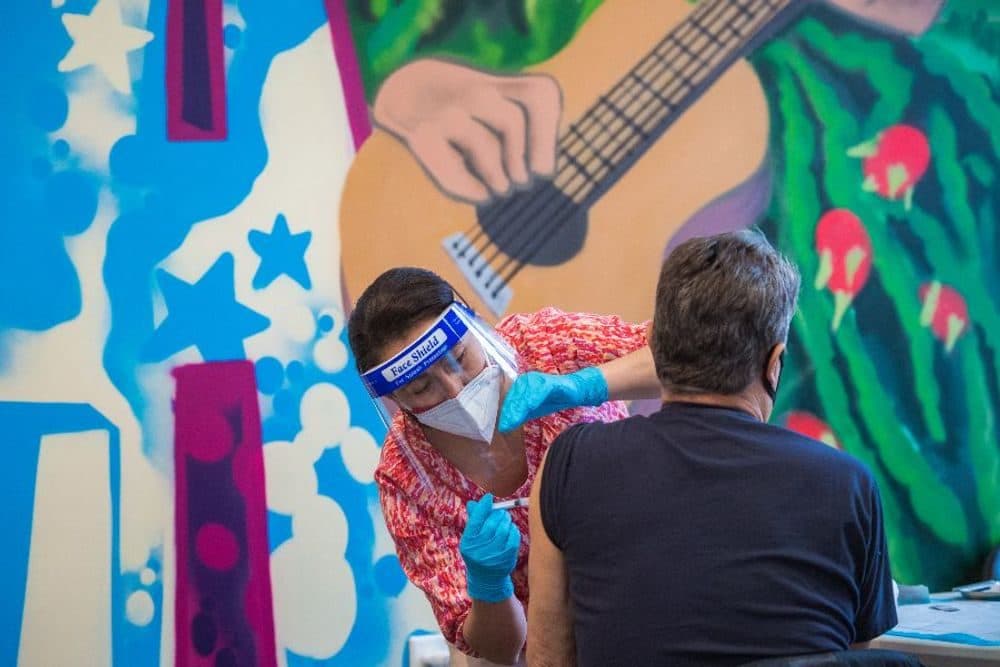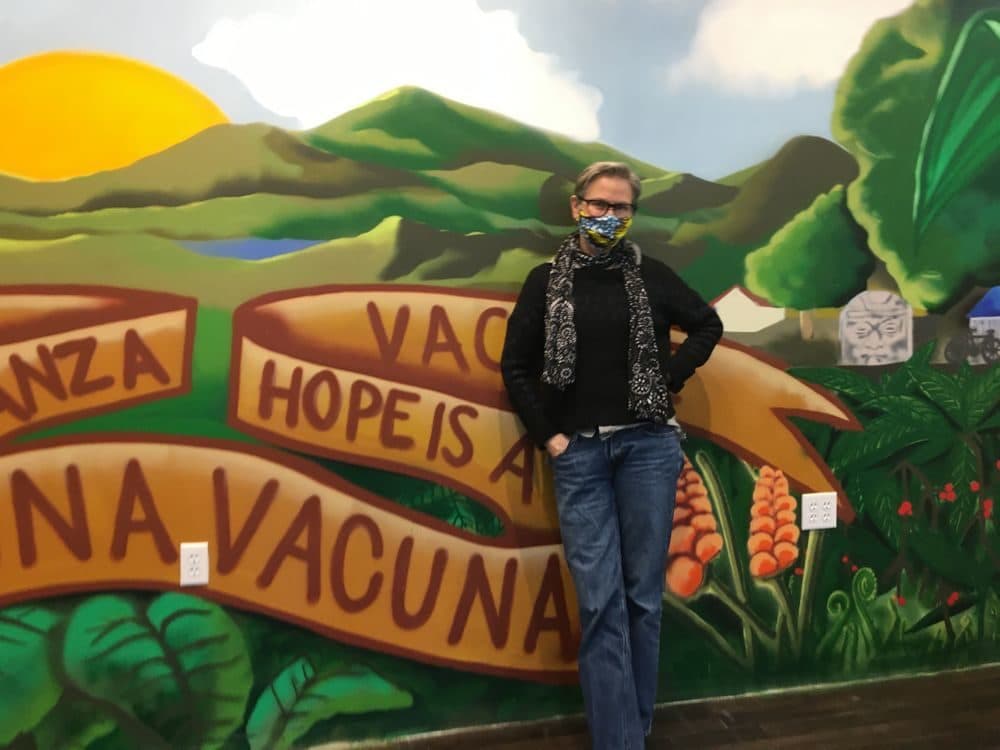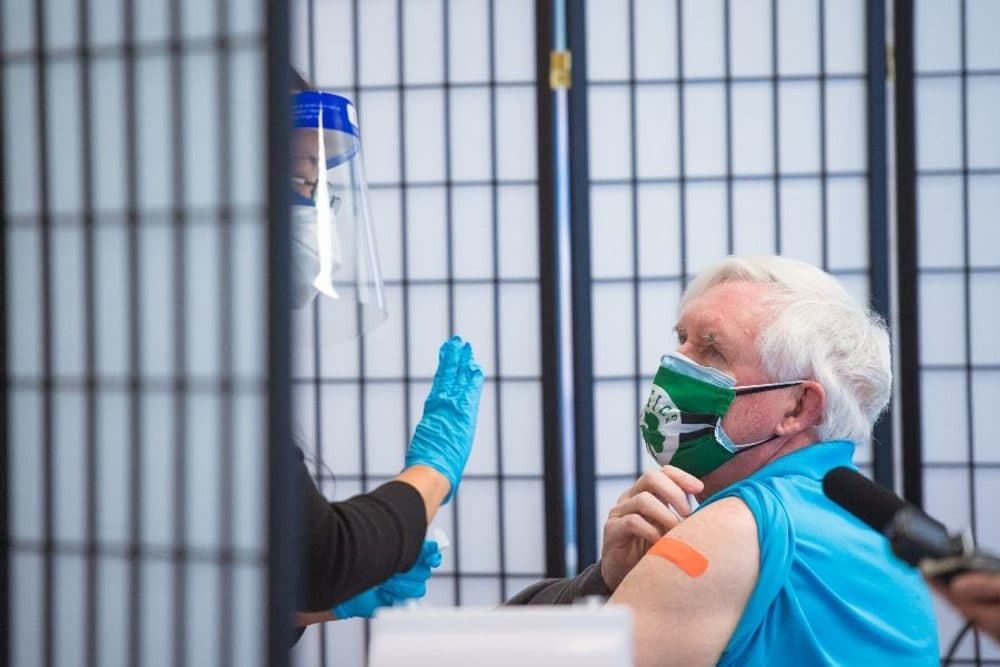Advertisement
Coronavirus Coverage
Hundreds From Across R.I. Sign Up For COVID-19 Shots Meant For Hard-Hit Neighborhoods
Resume
Inside a storefront health clinic in a Price Rite shopping plaza in Providence, the regulars are mostly immigrants who speak Spanish, Portuguese and Creole. They work cleaning offices, washing cars and fileting fish in grocery stores.
And nearly one in four of the patients last month tested positive for the coronavirus, said Dr. Annie De Groot, the volunteer medical director at the nonprofit Clinica Esperanza, or Hope Clinic.
“A lot of our patients have been waiting for the vaccine and dying before they got the vaccine,’’ De Groot said. “So we kind of would like to be able to vaccinate our population.”
But recently, a new clientele began showing up to be vaccinated. “They're all white,’’ De Groot said. “And they were driving up in BMWs and, you know, Mercedes and SUVs. And they were wearing mink coats.”
More than 70% of the people vaccinated at the clinic over a week in mid-February, De Groot said, were seniors from outside of Providence.
“It’s Barrington. It's Bristol. It's Westerly. It's South Kingston, North Kingston,’’ Lauren Greene, the associate clinical director, said. “They're coming from all over Rhode Island.”

State health officials say the influx was because a local community organization shared the clinic’s registration link with its members, who then shared it with other people outside the community.
“People who are in affluent neighborhoods, who have access to computers, who have access to technology, and can easily get on these platforms and book those spaces,’’ said Christopher Abhulime, a member of the state health department’s vaccine subcommittee who was appointed Tuesday night as Governor Daniel J. McKee’s deputy chief of staff.
The problem of access is the same, Abhulime said, for people trying to sign up for a vaccine at their local CVS. “By the time it gets to the minority community,’’ he said, “the vaccine is already booked up.”
Latinos make up 17% of Rhode Island’s population, and 30% of the COVID-19 cases. But they have received just 9% of the state’s vaccine, according to the latest data from nonprofit Kaiser Family Foundation. Black people make up 6% of the state’s population and 8% of the cases. But so far, they have received just 4% of the vaccine.
Similar disparities are showing up across the country, and experts say the reasons are as deeply rooted as the inequities in America’s healthcare system. And those inequities are playing out as Rhode Islanders scour the internet for a vaccine in short supply.
“It is the responsibility of government to set systems right,’’ said Doris De Los Santos, a former board chair of Clinica Esperanza and the Providence City Council’s deputy chief of staff for special projects. “To serve the population across the board, but more so the disadvantaged.”
Rhode Island health officials say plans are underway to target more vaccines to the state’s hardest-hit zip codes, where many of the state’s Black and Latinx residents live. That’s what they’ve been doing in Central Falls. And health officials say they are working with vaccinators to discourage people from sharing registration links with those outside the target communities, as happened with Clinica Esperanza.
On a recent Monday afternoon at the clinic, Paul Higgins joked with a Latina health care worker as he rolled up his sleeve for a shot. Higgins is 67 and lives in Warwick. He recently retired from a career in logistics. He said his wife was searching for appointments online when she finally found an opening. “The first one she clicked on happened to be here,’’ he said, “and that's how we ended up coming here.”

Joseph Rose was up next. He is 66 and lives in Portsmouth. He owns a real estate company in Newport.
“Most people that want the vaccine will go wherever you have to go,’’ he said, unless you can't, you know, if you don't have transportation.’’
Lack of transportation to mass vaccination sites like the one at the Dunkin’ Donuts Center in downtown Providence is a big reason why Clinica Esperanza opened in the city’s Olneyville section. And the staff was planning to use the 400 vaccine doses it has been receiving from the state each week for people in these hard-hit communities. That came as a surprise to Rose, the businessman from Portsmouth.
“I wouldn't have come here then,’’ he said, “If I thought...that was a concern. I didn't know anything about that.”
On his way out the door, Rose wondered aloud whether or not he should return to the clinic for his second shot. But his appointment was already booked.
This story is a production of New England News Collaborative. It was originally published by The People's Radio in Rhode Island on March 3.
This segment aired on March 4, 2021.